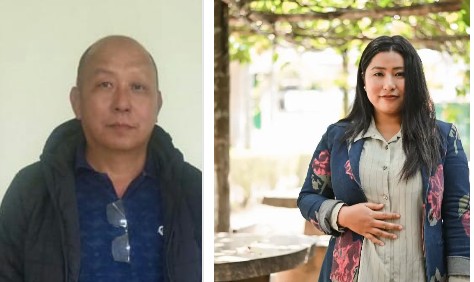MONDAY, JUNE 23, 2025
- Home
- World Press Freedom Day: Challenges of reporting in a state with strong tribal affiliations
World Press Freedom Day: Challenges of reporting in a state with strong tribal affiliations
H Chishi, lamented that many media houses in the country have either landed in the hands of undemocratic forces or have become their puppets.
Published on May 2, 2025
Share

Nagaland journalists H Chishi and Kekhriesenuo Kiewhuo.
- KOHIMA — Emphasising that true press freedom means reporting without fear or favour, senior journalist from Nagaland, H Chishi, lamented that many media houses in the country have either landed in the hands of undemocratic forces or have become their puppets.
- Sharing his experience as a journalist on the occasion of ‘World Press Freedom Day’, Chishi cited how difficult it is to access official information and also how journalists are pressured to drop stories or threatened not to write reports on certain issues.
- He also remarked that some government sources are not cooperative enough to provide information, and it requires media persons to “pull up their socks”.
- But unlike in the past, he observed that public awareness of the importance of a free press has increased over time.
Also read: Dimapur Police arrest man for impersonating doctor
- He also noted that government departments and institutions often withhold information due to fear of public backlash. Chishi, however, insisted that journalists should not be deterred from seeking the truth and reporting important stories despite potential consequences.
- Sharing his personal experience, the senior journalist said he had encountered several instances where he was threatened with defamation suits or threats to take him to court.
- Chishi recounted a personal experience of receiving death threats from militants for his reporting, but he had stood firm and refused to apologise or back down. He disclosed that similar threats were also meted out to his colleagues.
- In addition, he was dragged to court for writing about anomalies in certain government departments.
- He also disclosed that various groups, including tribe hohos, student unions, and religious bodies, often try to influence media coverage. To this, he asserted that journalists should never succumb to such unhealthy and undemocratic pressures.
- According to Chishi, journalists must practise self-censorship and function within certain parameters, given the challenges of reporting on sensitive issues like corruption in a state with strong tribal affiliations.
- Further, he pointed out that delayed payments of advertisements by government departments hamper the smooth functioning of media houses in Nagaland.
- Urging fellow journalists not to indulge in “yellow journalism and unethical reporting”, he also called on the government to provide more support to the press, recognising its crucial role as a voice for the people.
- Kekhriesenuo Kiewhuo, another local journalist, shared her experience as a field reporter, highlighting the difficulties in obtaining official information and government data as one of the biggest challenges she faces.
- When approached, the department officials agree to give information but only “off the record”, and they refuse to speak on camera, as only department directors are authorised to speak, she explained. Most requests for access to official data often go unanswered, she added.
- Speaking on the challenges she faces as a journalist in the state, Kiewhuo said that in this profession, one is required to delve into a variety of subjects, be it human interest stories or even stories relating to injustice in the society, which needs to be heard and seen by the public and, more importantly, by the law-enforcing agencies.
- Kiewhuo also disclosed that while covering reports on crimes and injustices, people involved try to compromise or influence the journalists. When these fail, they resort to threats, she added.
- She further shared her personal experience of facing intimidation from accused individuals, who would often claim connections to influential leaders, implying potential repercussions if she didn't back off from her reporting.

